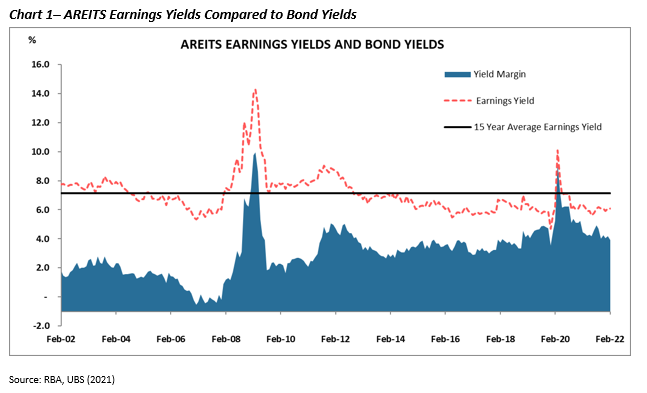By Chris Owens, analyst, Atchison Consultants
Australian real estate investment trusts (AREITs), as represented by the S&P/ASX 200 AREIT Index, returned 1.4% in the month ending 28 February 2022. AREITs underperformed the S&P/ASX 200 return of 2.1% over the month.
Over the 12 months to February 2022, AREITs posted a strong total return of 23.9%, outperforming the S&P/ASX 200 return of 10.2%.
Sector Performance
Table 1 below shows the performance of AREITs for various periods ending 28 February 2022.
Over the 3 years and 5 years to the end of February, the sector produced total returns of 6.8% and 7.7% per annum respectively.
Sector returns were led by Retail AREITs at 7.2%, followed by Office AREITs at 6.0%, Diversified AREITs at 1.1% and Industrial AREITs with -3.9%.
Table 2 below shows the income performance of AREITs for various periods ending 28 February 2022.
The income component of the total return was 3.8% for the 12-month period to February. Annual volatility of income returns was 1.8%, which is low when compared with other asset classes.
AREITs were trading at an earnings yield of approximately 6.2%, significantly higher than yields of both cash and Commonwealth Government bonds. The spread of the earnings yield over the 10-year government bond yield remained steady at 3.9%.
Changes over time of the spread between the earnings yield of AREITs and the 10-year government bond yield are shown in Chart 1.
Market Review
During the peak of COVID-19 restrictions in October 2021, office occupancy rates for Melbourne and Sydney fell to 4% and 7% respectively. However, office occupancy climbed with the lifting of mask mandates in February. Brisbane experienced the largest increase, from 11% in January to 47% a month later. Melbourne and Sydney did not increase quite as dramatically, with increases of 11 percentage points each.
Despite COVID-19 restrictions being virtually non-existent, only 14% of workers have returned to the office, 19% working from home full time and 66% working one to four days a week (“Liberated Work”, Worktech Australia, March 2022). Shrinking office leasing demand remains a fear for commercial landlords with only 21% of office workers seeing themselves working in the office full time.
This has led to expansion in the co-working industry. Hub Australia said it has seen a 60% increase in inquiries for co-working space since the beginning of 2021. Hub is developing six new sites to accommodate businesses looking to accommodate hybrid work patterns.
All the same, the impact hybrid work practices will have on office AREITs remains uncertain. The Centuria Office AREIT says demand for metropolitan office assets remains high with an average cap rate of 5.1%. The value of its assets increased from $2.0 billion in February 2021 to $2.3 billion in February 2022.




